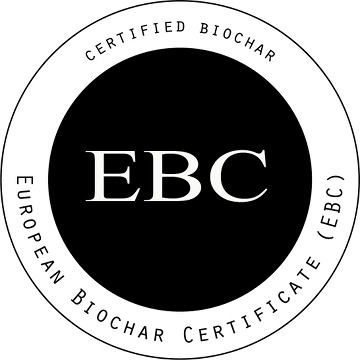The European Biochar Certificate (EBC)
For thousands of years, charcoal has been one of civilisation's basic materials. By far the most common use of charcoal was for cooking, for heating and for smouldering when producing metal tools. However, for centuries charcoal and biochar have also been used for conditioning soils, or as litter (bedding) materials, as medicine and also as a feed additive. Over the course of the last century most of this traditional knowledge has been lost yet is being rediscovered since 2010.
Thanks to wide-ranging multidisciplinary research and field trials, the understanding of the biological and physico-chemical processes involved in the production and use of biochar has made great progress. A significant increase in the agricultural use of biochar has already been recorded since 2015. From 2020 onwards, a further acceleration in both agricultural and industrial use of biochar is expected. Agricultural applications range from soil conditioners, composting additives and carriers for fertilisers to manure treatment and stable bedding, silage additives and feed additives. Industrial applications are particularly relevant to the construction, plastics, paper and textile industries.
Traditional kiln production of charcoal and biochar without the combustion of pyrolytic gases is unsatisfactory with regards to its carbon efficiency and its overall environmental footprint. Accordingly, those kilns are unsuitable for the production of larger amounts of biochar to be used in agriculture or industry. Modern pyrolysis plants as well as certain types of farmer-scale kilns such as flame curtain pyrolysis systems are now ready to produce biochar from a large variety of different feedstocks in an energy efficient way and without harming the environment. As both biochar properties and the environmental footprint of its production are largely dependent on the pyrolysis parameters and the type of feedstocks to be used, a secure control and assessment system for its production and analysis had to be introduced.
In issuing these guidelines the Ithaka Institute intents to introduce an assessment mechanism based on the latest research and practices. By requiring the use of this assessment system, the European Biochar Certificate (EBC) will enable and guarantee sustainable biochar production, processing and sale. It is introduced to provide customers with a reliable quality standard, while giving producers the opportunity to prove that their products meet well-defined and recognized quality standards. It further aims to provide a firm state-of-the-art knowledge transfer as a sound basis for future legislation (e.g. EU fertilizer regulations or carbon-sink regulations).
Biochar technology continues to develop very rapidly. Numerous research projects around the world are investigating the properties of biochar and their interaction with other substances, materials and the environment. Every year sees new manufacturers of pyrolysis equipment entering the market and the areas in which biochar and biochar products are used is growing rapidly. The European Biochar Certificate is closely aligned with this research and technical momentum and will accordingly be revised regularly to take into account the latest findings and developments. Thresholds and test methods will be adapted to reflect the latest findings and amended or updated as necessary.
The goal of these guidelines is to encourage and ensure the control of biochar production and quality based on well-researched, legally backed-up, economically viable and practically applicable processes. Users of biochar and biochar-based products will benefit from transparent and verifiable monitoring and quality assurance. It is our moral obligation as well as the duty of every biochar user's duty to make sure that a good idea is not be corrupted. The certificate was designed to serve this goal.
Currently, the European Biochar Certificate is a voluntary industry standard in Europe. In Switzerland, however, it is obligatory for all biochar sold for use in agriculture. Several other countries aligned their biochar related regulations with the EBC.


